- Home
- Site Index
- About Me
-
My Books
- Book List & Themes
- Strictly for Adults Novels >
-
Tales from Portlaw
>
- No Need to Look for Love
- 'The Love Quartet' >
-
The Priest's Calling Card
>
- Chapter One - The Irish Custom
- Chapter Two - Patrick Duffy's Family Background
- Chapter Three - Patrick Duffy Junior's Vocation to Priesthood
- Chapter Four - The first years of the priesthood
- Chapter Five - Father Patrick Duffy in Seattle
- Chapter Six - Father Patrick Duffy, Portlaw Priest
- Chapter Seven - Patrick Duffy Priest Power
- Chapter Eight - Patrick Duffy Groundless Gossip
- Chapter Nine - Monsignor Duffy of Portlaw
- Chapter Ten - The Portlaw Inheritance of Patrick Duffy
- Bigger and Better >
- The Oldest Woman in the World >
-
Sean and Sarah
>
- Chapter 1 - 'Return of the Prodigal Son'
- Chapter 2 - 'The early years of sweet innocence in Portlaw'
- Chapter 3 - 'The Separation'
- Chapter 4 - 'Separation and Betrayal'
- Chapter 5 - 'Portlaw to Manchester'
- Chapter 6 - 'Salford Choices'
- Chapter 7 - 'Life inside Prison'
- Chapter 8 - 'The Aylesbury Pilgrimage'
- Chapter 9 - Sean's interest in stone masonary'
- Chapter 10 - 'Sean's and Tony's Partnership'
- Chapter 11 - 'Return of the Prodigal Son'
- The Alternative Christmas Party >
-
The Life of Liam Lafferty
>
- Chapter One: ' Liam Lafferty is born'
- Chapter Two : 'The Baptism of Liam Lafferty'
- Chapter Three: 'The early years of Liam Lafferty'
- Chapter Four : Early Manhood
- Chapter Five : Ned's Secret Past
- Chapter Six : Courtship and Marriage
- Chapter Seven : Liam and Trish marry
- Chapter Eight : Farley meets Ned
- Chapter Nine : 'Ned comes clean to Farley'
- Chapter Ten : Tragedy hits the family
- Chapter Eleven : The future is brighter
-
The life and times of Joe Walsh
>
- Chapter One : 'The marriage of Margaret Mawd and Thomas Walsh’
- Chapter Two 'The birth of Joe Walsh'
- Chapter Three 'Marriage breakup and betrayal'
- Chapter Four: ' The Walsh family breakup'
- Chapter Five : ' Liverpool Lodgings'
- Chapter Six: ' Settled times are established and tested'
- Chapter Seven : 'Haworth is heaven is a place on earth'
- Chapter Eight: 'Coming out'
- Chapter Nine: Portlaw revenge
- Chapter Ten: ' The murder trial of Paddy Groggy'
- Chapter Eleven: 'New beginnings'
-
The Woman Who Hated Christmas
>
- Chapter One: 'The Christmas Enigma'
- Chapter Two: ' The Breakup of Beth's Family''
- Chapter Three: From Teenager to Adulthood.'
- Chapter Four: 'The Mills of West Yorkshire.'
- Chapter Five: 'Harrison Garner Showdown.'
- Chapter Six : 'The Christmas Dance'
- Chapter Seven : 'The ballot for Shop Steward.'
- Chapter Eight: ' Leaving the Mill'
- Chapter Ten: ' Beth buries her Ghosts'
- Chapter Eleven: Beth and Dermot start off married life in Galway.
- Chapter Twelve: The Twin Tragedy of Christmas, 1992.'
- Chapter Thirteen: 'The Christmas star returns'
- Chapter Fourteen: ' Beth's future in Portlaw'
-
The Last Dance
>
- Chapter One - ‘Nancy Swales becomes the Widow Swales’
- Chapter Two ‘The secret night life of Widow Swales’
- Chapter Three ‘Meeting Richard again’
- Chapter Four ‘Clancy’s Ballroom: March 1961’
- Chapter Five ‘The All Ireland Dancing Rounds’
- Chapter Six ‘James Mountford’
- Chapter Seven ‘The All Ireland Ballroom Latin American Dance Final.’
- Chapter Eight ‘The Final Arrives’
- Chapter Nine: 'Beth in Manchester.'
- 'Two Sisters' >
- Fourteen Days >
-
‘The Postman Always Knocks Twice’
>
- Author's Foreword
- Contents
- Chapter One
- Chapter Two
- Chapter Three
- Chapter Four
- Chapter Five
- Chapter Six
- Chapter Seven
- Chapter Eight
- Chapter Nine
- Chapter Ten
- Chapter Eleven
- Chapter Twelve
- Chapter Thirteen
- Chapter Fourteen
- Chapter Fifteen
- Chapter Sixteen
- Chapter Seventeen
- Chapter Eighteen
- Chapter Nineteen
- Chapter Twenty
- Chapter Twenty-One
- Chapter Twenty-Two
-
Celebrity Contacts
-
Thoughts and Musings
- Bereavement >
- Nature >
-
Bill's Personal Development
>
- What I'd like to be remembered for
- Second Chances
- Roots
- Holidays of Old
- Memorable Moments of Mine
- Cleckheaton Consecration
- Canadian Loves
- Mum's Wisdom
- 'Early life at my Grandparents'
- Family Holidays
- 'Mother /Child Bond'
- Childhood Pain
- The Death of Lady
- 'Soldiering On'
- 'Romantic Holidays'
- 'On the roof'
- Always wear clean shoes
- 'Family Tree'
- The importance of poise
- 'Growing up with grandparents'
- Love & Romance >
- Christian Thoughts, Acts and Words >
- My Wedding
- My Funeral
- Audio Downloads
- My Singing Videos
- Bill's Blog
- Contact Me
Chapter Eight: 'Patrick Duffy Groundless Gossip'
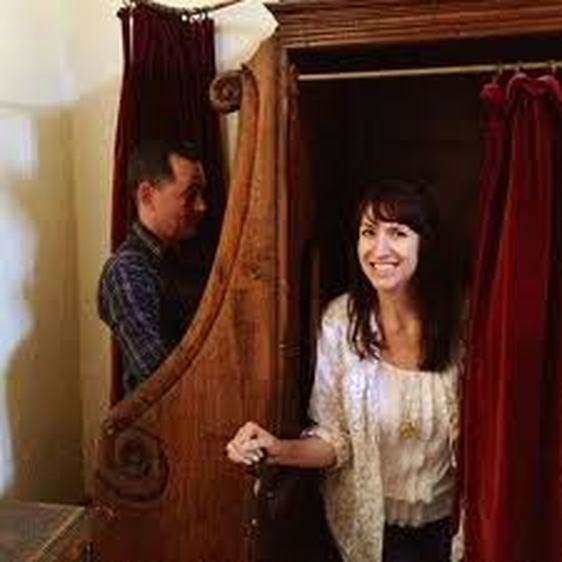
Whatever their manner of exit from the pub on Friday nights, Father Patrick knew that the likelihood of more serious and more frequent sin being committed on a Friday night as opposed to any other night of the week was infinitely greater. Therefore Saturdays were the most productive of days to listen to confessions. So whatever their sinful preference happened to be, albeit the use of contraceptive devices, sexual perversion, swearing, fighting, sodomising a sheep, mere drunkenness or simply sloth, Father Patrick was well-enough versed in Portlaw ways to make his job as parish priest more productive by being well prepared.
On a more mysterious level, the visible effects upon the women leaving his Confessional Box varied enormously with those of the men of Portlaw. He was the only priest in the whole of Ireland who could make the women who came out of his confessional booth look very happy that they'd just confessed their innermost thoughts to their pastor!
On a more mysterious level, the visible effects upon the women leaving his Confessional Box varied enormously with those of the men of Portlaw. He was the only priest in the whole of Ireland who could make the women who came out of his confessional booth look very happy that they'd just confessed their innermost thoughts to their pastor!
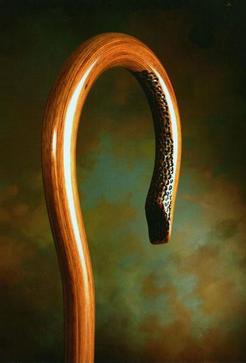
Father Patrick made his house visits to see parishioners on Mondays and Wednesdays and in the event of an emergency, he would naturally visit if and as required. Whenever the priest visited a house in Portlaw, he would place his walking stick outside after leaning it against the wall and then, open the door (without knocking), and walk inside the house. Any visitor inside, upon seeing the priest enter their presence, would quickly make their excuses and leave. Once the priest's stick had been placed against the wall, woe betide any person who dared to enter and to interrupt the Lord's work!

If ever anyone passed a house and saw the priest’s walking stick outside, one knew church business to be in process and therefore, not to enter and interrupt Father Duffy. Children and young persons of Portlaw were told firmly by their parents that whatever else they got up for a laugh and a gas in their spare time, teasing Father Duffy was clearly out of bounds. They had it drilled into them that whatever or whoever else they ran off with, they were 'never' to run off with the priest’s walking stick. Indeed, the people of Portlaw would go to any lengths to avoid offending their parish priest. It was even said that they’d sooner hear that their son had robbed the Post Office or that their 16-year-old daughter had been made pregnant by 34-year-old fairground worker from Bally Duff than hear that they’d interfered with the priest’s walking stick or had dared to enter a house where Father Duffy had left his calling card in clear view!

Over the next two years, the parish congregation of Portlaw continued to grow along with the mounting degree of influence and authority that Father Duffy was able to assert over the people of Portlaw. All of the women in Portlaw were secretly in love with this quiet man of God who possessed the power to make their pulses race and their hearts skip a beat, merely by a brief look in their direction or a slight gesture of his hand. Many a young woman aged around eighteen years, would even go to such lengths as to pray that the 'simply gorgeous' Father Patrick (as they'd invariably described him in conversation), would leave the priesthood and run away with them! The men, on the other hand, merely saw him as a man of God; one of the Christian ‘untouchables’ who could do no wrong because he was guided by God on high and the Pope in Rome.

Had anyone however, endeavoured to make the priest’s house calls a specific ‘time and motion’ study they would have discerned a very peculiar pattern emerging. It eventually became evident by both the presence and absence of the priest’s walking stick that the lengths of time he spent in some houses he visited in Portlaw varied enormously. Whereas he’d spend mere minutes in one house, he could be two hours in another or even the best part of an afternoon. Also, there would be certain houses that he visited every Monday and Wednesday whereas other houses would only be called on once a year.
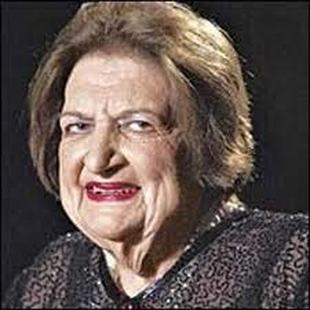
If one then paid particular attention to ‘whom’ he visited for longer periods of time and ‘how frequently', it became evident that the priest visited all the more attractive women of Portlaw more often and for longer than any of the less attractive women of the parish or the men and senior citizens.
The priest's visiting pattern, was obvious to the discerning observer, but clear as the implication was, there was no parishioner brave enough to confront him or to think him 'guilty' purely on circumstantial evidence.
The priest's visiting pattern, was obvious to the discerning observer, but clear as the implication was, there was no parishioner brave enough to confront him or to think him 'guilty' purely on circumstantial evidence.

In a short period of time, a pattern of the priest’s visiting behaviour became more and more noticeable. The citizen of Portlaw occasionally allowed such awareness to momentarily enter their head before instantly dismissing it as being sacrilegious to hold onto long enough for it to become a whispered word. Only the local gypsies, who lived two miles along the Carrick-on Suir Road were prepared to freely gossip about the goings on and rumours of the Portlaw priest.

There was one lady in Portlaw, the widow Jezzabel Hussy, who was visited by Father Duffy more often than any other person the priest called on and for much longer visits. Widow Hussy was a 39-year-old red-haired beauty whose husband had sadly died two years earlier as the result of an industrial accident. Having been born an only child and only married for three months when her husband died, she had been left in a state of bereavement without the traditional support structure that one invariably finds from one’s friends and extended family.

It was only natural therefore that the widow should turn to her parish priest for counselling and support after her husband’s sudden death, especially one as sympathetic and as attractive as Father Duffy who seemed prepared to give the widow as much time as she wanted. It may well have been the priest’s walking stick outside the widow’s house every Monday or Wednesday afternoon for at least an hour that first raised suspicious minds to contemplate the ‘unthinkable’. But it was those occasions that a stranger dressed in black was observed by a Portlaw person either entering Widow Hussy’s house late at night or leaving it furtively during the early morning hours that encouraged those unthinkable and speculative thoughts to manifest themselves into common gossip as to who it could have possibly been; especially as there was no stick stood outside the widow’s house on these irregular hours of night.

Nine months later, Widow Hussy, gave birth to a strapping infant boy. With the exception of slightly crooked pinkie fingers on either hand, the infant was a perfect specimen of child beauty. Many people asked the widow who the father of the child was, unless she was proposing to lay claim to an immaculate conception, but Widow Hussy had no intention of giving them personal information about her own private life. She simply told the prurient inquirers that it was none of their business and as she had no current commitments to any man, she was at liberty to have a child by whoever she pleased.
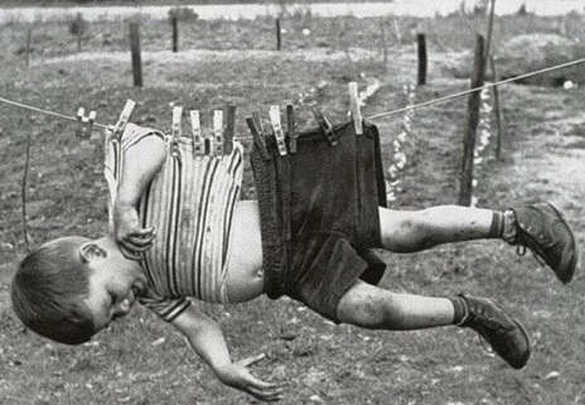
Some folk in Portlaw may have entertained the worse of thoughts about their parish priest, but in their inner sanctums, they refrained from voicing such heretical thoughts to anyone else outside their wives and husbands. The odd wild lad who dared to voice what his parents dare not would be given short shrift and hung out to dry for a few hours as a tried and tested Portlaw punishment. After the birth of Widow Hussy’s child, Father Duffy increased his number of visits to her house, but kept them all within daytime hours and with his ‘calling card’ visible against the house wall for all to see.

Some Portlaw parishioners thought the continuation of their priest’s practice unwise in the circumstances and a few even considered it as being outright defiant. It was as though Father Duffy was ‘cocking a snoop’ at them all and laughing behind their backs while he cavorted in the arms or indeed the bed of Jezzabel Hussy. While none dare confront the priest about their suspicions, the shepherd might bleat the truth out to his sheep, knowing full well that they'd not tell anyone. Eventually, a few village trouble makers and lapsed Catholics felt brave enough to write an anonymous letter to the Bishop of Waterford, outlining their fears of their priest’s behaviour, which they described as being ‘irregular’ at best and ‘wicked’ at worst.
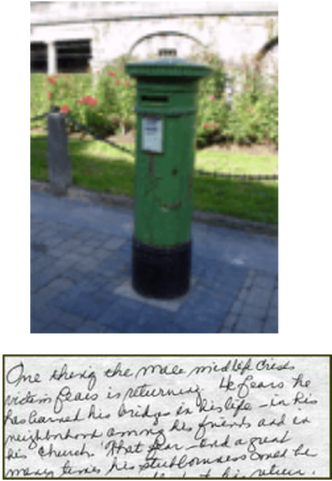
When the Bishop of Waterford received these written complaints, he was naturally obliged to place the allegations before the parish priest of Portlaw. Father Duffy read the anonymous letters that the Bishop had received and instantly dismissed them as being untrue. He gave the bishop no indication that he intended to elaborate upon his response. The Bishop of Waterford could see that he needed to handle the matter before him with extreme caution, especially as the writers had opted for anonymity instead of facing the priest they'd made these malicious slurs and insinuations against. Also, Father Duffy had improved the church attendance figures in Portlaw so much, that even the priest’s namesake, St. Patrick, would have had difficulty of achieving the same results in County Down during his years of converting heathen Ireland to Christianity.

It was only after Father Duffy was satisfied that The Bishop of Waterford fully believed his total innocence in these matters that he deigned to provide his superior with an explanation.
He said, “I saw the widow initially, Your Grace, after her husband died and she requested that I call on her. I found her to be experiencing manic moods and episodes of severe depression. One month, she was crying for two nights and days non-stop; and the day after, she had donned her ballerina outfit and was dancing out in the snow as though she was performing at the Bolshoi Theatre. I considered her to be close to a suicidal state of mind and I offered to refer her to one of the best grief counsellors I knew of. She refused any such referral, saying that she’d speak to no other counsellor but her parish priest; myself. I was left with no other option, and fearful that she might take an overdose whilst in a state of emotional instability, I naturally agreed. She required intensive counselling, Your Grace, which I always did on a Monday and Wednesday afternoon.
Then, almost a year ago, she confided in me that she had started a relationship with a married man from Carrick-on-Suir. Then, the Widow Hussy got pregnant and again fell suicidal. She started to call me more frequently than before and at more irregular times of the day and night; more or less saying that if I didn’t call on her within the following half an hour, she would kill herself. Naturally, I did what I thought to be best in the interest of my parishioner, and as they say, the rest is history. I’m just so sorry that Your Grace has been troubled by these false accusations; this tittle tattle and slur upon my character.”
“Say no more, Father Duffy" the bishop replied. "In fact, while you’re here we may as well make it official now. How does 'Monsignor Duffy' sound to you, Father? After the phenomenal success you have already demonstrated by increasing the Portlaw congregation six fold, I applied to the Vatican to have you appointed 'Monsignor Duffy and have just received confirmation back.”
He said, “I saw the widow initially, Your Grace, after her husband died and she requested that I call on her. I found her to be experiencing manic moods and episodes of severe depression. One month, she was crying for two nights and days non-stop; and the day after, she had donned her ballerina outfit and was dancing out in the snow as though she was performing at the Bolshoi Theatre. I considered her to be close to a suicidal state of mind and I offered to refer her to one of the best grief counsellors I knew of. She refused any such referral, saying that she’d speak to no other counsellor but her parish priest; myself. I was left with no other option, and fearful that she might take an overdose whilst in a state of emotional instability, I naturally agreed. She required intensive counselling, Your Grace, which I always did on a Monday and Wednesday afternoon.
Then, almost a year ago, she confided in me that she had started a relationship with a married man from Carrick-on-Suir. Then, the Widow Hussy got pregnant and again fell suicidal. She started to call me more frequently than before and at more irregular times of the day and night; more or less saying that if I didn’t call on her within the following half an hour, she would kill herself. Naturally, I did what I thought to be best in the interest of my parishioner, and as they say, the rest is history. I’m just so sorry that Your Grace has been troubled by these false accusations; this tittle tattle and slur upon my character.”
“Say no more, Father Duffy" the bishop replied. "In fact, while you’re here we may as well make it official now. How does 'Monsignor Duffy' sound to you, Father? After the phenomenal success you have already demonstrated by increasing the Portlaw congregation six fold, I applied to the Vatican to have you appointed 'Monsignor Duffy and have just received confirmation back.”
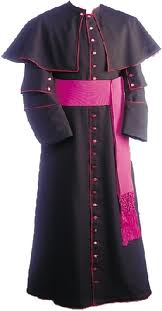
Father Duffy had entered Bishop’s House under a cloud of suspicion that day and had left it a Monsignor. The people of Portlaw eventually feared that they’d misjudged a good man in their midst. Monsignor Duffy did no explaining to any of his parishioners, as he realised it would prove unnecessary. These things have a way of ‘getting out’ and being heard ‘unofficially’ by someone of influence in the parish who commands no less than the ear of the Bishop of Waterford. Such a person is well capable of making sure that what the Bishop has learned, so will his flock!
|
Click here for the next page
|
Click here for the previous page
|


